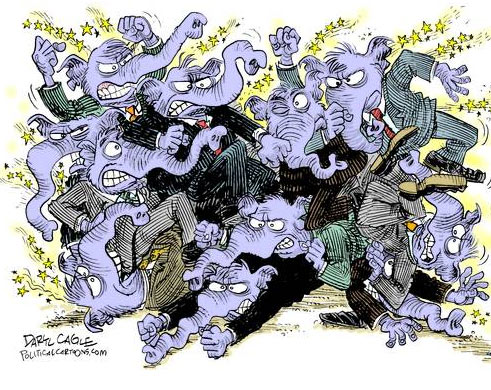
WASHINGTON -- The Donald Trump phenomenon ranks as the great political story of 2015 -- and maybe 2016 -- but could it simply be a subplot of a bigger story: what commentator David Frum, once a speechwriter for President George W. Bush, calls the Republican party's "internal class war"? Yes, argues Frum. His thesis is laid out in engrossing detail in the January/February issue of The Atlantic, where he is a senior editor. I don't usually recommend other journalists' work, but Frum's provocative analysis is definitely worth a look (available at http://tinyurl.com/go22fnj).
Briefly, his argument goes like this:
Republicans have traditionally run on what he calls Conservatism Classic: "tax cuts, budget cuts, deregulation [and] free trade." This was the essence of Mitt Romney's agenda, and it's what the party's wealthy donors expected of the 2016 campaign. The trouble is that this pro-business platform is rejected by much of the party's voter base, who support "entitlement" spending (read: Social Security and Medicare), favor higher taxes on the rich and fear free trade.
To corroborate this, Frum cites a Gallup poll finding that many Republicans -- nearly 30 percent -- advocate "heavy" taxes on the wealthy. By contrast, only 21 percent endorse cuts in Medicare and fewer still, 17 percent, support reducing Social Security.
There is an economic and social chasm between these Republicans and the party's traditional elite, says Frum. The elite reads The Wall Street Journal, and many make huge campaign contributions. A case in point: In the second quarter of 2015, about four-fifths of the money donated to Jeb Bush's super PAC came in gifts exceeding $25,000; a quarter were $1 million or more. Meanwhile, Trump's backers are decidedly skewed toward the lower middle class. Writes Frum:
"Half of Trump's supporters within the GOP had stopped their education at or before high-school graduation, according to the polling firm YouGov. Only 19 percent had a college or post-college degree [the U.S. average: 29 percent among adults 25 years and older]. Thirty-eight percent earned less than $50,000. ... Trump Republicans were not ideologically militant. Just 13 percent said they were very conservative. ... What set them apart from other Republicans was their economic insecurity and the intensity of their economic nationalism."
Trying to force-feed this group a giant helping of Conservatism Classic (say, in the person of Jeb Bush) produced political regurgitation. Particularly indigestible was any support for legalizing the status of the estimated 11 million undocumented immigrants -- people whom many Trump backers regard as cheats, criminals or competitors for jobs and government benefits. Both Bush and Marco Rubio have backed some form of legalization, which many GOP leaders regard as necessary to build support in the rapidly growing Hispanic population.
So there is a deep schism among Republicans. One defect of Frum's account is that he attributes loyalty to Conservatism Classic to only a small number of wealthy donors. The reality is that these views reflect the attitudes of millions of traditional "mainstream" Republicans. There is a genuine clash of values and policies. Trump's political genius was to recognize, either consciously or intuitively, that he could succeed politically without aping traditional Republican positions.
The larger story is not Trump but the question of whether the Republican Party can survive this civil war. It is certainly true that, for decades, both the Democratic and Republican parties have overcome deep conflicts and contradictions among their various supporters. Democrats once harbored both liberals and segregationists; Republicans have long been splintered between economic and social conservatives. The quest for power has bred political pragmatism.
The result is a strong and durable two-party tradition. People cling to what's familiar. Party identification often reflects the lesser evil more than the greater good. Doubts about one party are swamped by dislike of the other. Inertia is a powerful force in politics as in life. History suggests more of the same, but it is not a foregone conclusion. The Republican Party's fate hangs in the balance.
Comment by clicking here.


 Contact The Editor
Contact The Editor
 Articles By This Author
Articles By This Author
